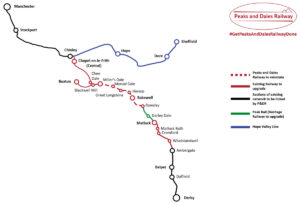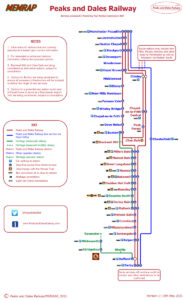Derbyshire residents and visitors could benefit from exciting proposals currently being considered by government. Developed by local campaign group, Manchester and East Midlands Rail Action Partnership (MEMRAP), the proposals would see reinstatement of the railway between Buxton, Chinley and Matlock, closed at the end of the Beeching era in 1968 by Labour Minister for Transport, Barbara Castle.
The current Secretary of State for Transport, Grant Shapps, transformed the prospects for UK railway reinstatement in January 2020 by announcing the ‘Restoring Your Railways’ programme. With a £500m ‘pot’ for studies and development work, there are already high hopes for several crucial reversals of 1960s ‘Beeching Cuts’.
Buoyed by an early assessment last summer that the socio-economic case for this reinstatement was ‘strong’ – by a panel led by the Rail Minister, Chris Heaton-Harris and including Sir Peter Hendy, chair of Network Rail – the group made a further submission in March 2021 to Round 3 of the ‘Restoring Your Railway’ programme. Winners could be announced any time soon, but the group reckons the smart money is on end October, around the time of the budget and the expected launch of the government’s long-awaited ‘Integrated Rail Plan’ for the Midlands and the North.
‘Restoring Your Railway’ was set up by government as an MP-led programme. MEMRAP is obviously delighted its proposal already has the backing of five local MPs. Lead sponsor is Robert Largan in High Peak, and the second sponsor is Nigel Mills in Amber Valley. William Wragg (Hazel Grove) and Jane Hunt (Loughborough) are both supporters, highlighting the regional importance of this project, while cross-party Labour support comes from Lilian Greenwood in Nottingham South, the former chair of the Transport Select Committee.
MEMRAP proposals cover just 36 miles of track, comprising 13 miles of double-track railway to be reinstated, and 23 miles of existing line upgraded from currently mostly single-track. But this would enable passenger, freight, heritage and excursion services to run to and from Buxton and Chinley via Bakewell and Matlock to Ambergate Junction, boosting access to jobs, education and leisure opportunities locally, and along the whole route. Crucially, direct Derby to Manchester services would be reinstated, allowing connection of Manchester and Stockport with Derby, Loughborough and Leicester. Enhancement to capacity and connectivity in Derbyshire would be further improved by integrating operations with the Hope Valley line, benefiting residents of Sheffield too. [see schematic map of services proposed]
The numbers in MEMRAP’s case for reopening this iconic railway are suitably impressive:
- 150,000 people in Central Derbyshire, of whom c. 38,000 live in the Peak District National Park;
- 7 million people in the catchment along the full length of the Peaks and Dales route;
- this increases to 9 million people when Sheffield and the Hope Valley Line are added;
- 25 million annual visitors to the Peak District National Park, 90% of whom arrive by road – a situation described by the chair of the Peak District National Park Authority, Andrew McCloy, as “unsustainable”.
In addition, freight would also be able to use this railway, saving HGV trips on local roads as well as regionally and nationally, alleviating congestion, and reducing emissions. And the proposal includes the running of heritage services between Buxton and Matlock, realising an aim Peak Rail has held dear for 40 years.
The proposal to reinstate the railway recognises the need to re-provision the popular Monsal Trail, originally approved by the Peak District National Park Authority to ensure that the route of the railway was properly safeguarded for potential future railway reinstatement. So local volunteers at the Buxton Town Team (BTT) are working together to develop plans for the re-provisioning and expansion of the Monsal Trail. It’s a key part their work to improve walking and cycling provision in Buxton and the surrounding area. Whilst they remain neutral about the railway, their involvement is important, as they work on the basis that ‘if the railway is reinstated there must be an enhanced replacement for the Monsal Trail, so we need to be ready’. To further this aim, BTT and MEMRAP exchange information regarding progress on a regular basis.
The intention is to link up all the railway stations on the re-opened route, and to protect and enhance the trail’s ‘local micro-economy’, as well as create links with existing trails. Overall, the plans are set to enhance the experience for cyclists and walkers, and enable users of the trails to continue to enjoy the magnificent Peak District scenery, welcoming pubs, splendid eateries and fantastic attractions.
MEMRAP CEO, Stephen Chaytow, commented: “We’re looking forward to passenger trains for locals and visitors alike taking cars off the roads, freight trains transporting stone from the quarries taking HGVs off the roads, and heritage trains continuing to run to a specially-enhanced timetable and to mainline standards along a key part of the route. So, this re-opened railway really would play a full role in delivering prosperity and improving quality of life, becoming once again a vital artery across Derbyshire, as it was previously for around a century.”
The campaign has a healthy local following, with already nearly 19,000 signatories to the petition to reopen the line. And the group believes that residents of central Derbyshire can see a real and growing prospect of reinstatement for the ‘Nationally Significant Infrastructure Project’ that is the Peaks and Dales Line. Buxton residents and visitors, including the millions of environmentally-responsible visitors who are believed to be keen to come by train rather than car when they visit the Peak District National Park, will be able to have their say if the upcoming announcement, due from the Secretary of State soon, decides in MEMRAP’s favour.


Notes to the Editor
Organisation
The campaign to reinstate the Peaks and Dales Line is organised as follows:
- Project: Reinstate the Peaks and Dales Line (or P&DL)
- Campaign Lead: https://www.memrap.org/
- Promoter: https://www.peaksanddalesrailway.com/
- Business Sponsor: https://www.thegoodsheltergroup.com/
Associate (not part of the campaign team):
- Buxton Town Team, Safer Walking and Cycling:
https://www.youtube.com/watch?v=yVDjUoUZ-mQ (Monsal Trail re-provisioning)
The active working group within MEMRAP/ Peaks and Dales Railway is now 25 strong and the petition to re-open Petition · Re-open the Railway between Matlock, Bakewell, Buxton and Manchester · Change.org is now approaching 19,000 signatures.
Commercial sponsor
The high professional standards of the campaign would not have been possible without strong in-kind support from The Goodshelter Group, chaired by Ian Derbyshire, a close colleague of the MEMRAP CEO, Stephen Chaytow. Ian Derbyshire’s rail and consulting experience is key. Before starting consulting, nearly thirty years ago, Ian ran a railway, and developed proposals to extend it. These railway extensions were subsequently built and are doing well. The East London Line, and its northern and southern extensions, formed the initial part of the London Overground. Ian’s experience, coupled with that brought by his colleagues and the professionals within MEMRAP, brings together a level of skill and expertise that allows MEMRAP’s campaign input from its (widely praised and extensive) stakeholder engagement to be distilled into professional documents which continue to make an impact and attract favourable comment from key stakeholders – nationally, regionally, and locally.
The Monsal Trail
This project is envisioned as fully integrated, by design: ‘rail plus trail’. This recognises that the popular Monsal Trail today occupies 8.5 miles of the former railway track bed. It is already agreed with the Peak District National Park Authority that, in the event of a successful campaign, the railway reinstatement project would fund the reprovisioning, enhancement and extension of the Monsal Trail, complete with full integration with the railway at all the stations along the re-opened route.
Position with local authorities
MEMRAP has already secured support from Stockport Metropolitan Borough Council and Charnwood Borough Council. Other local authorities are in receipt of briefings and considering their positions. In correspondence with the (currently still unsupportive) Peak District National Park Authority and Derbyshire County Council (which is also still unsupportive), MEMRAP was advised to focus on the economic and environmental implications of the reinstatement. This advice, alongside the need to meet Department for Transport bidding rules, has helped to shape MEMRAP’s campaign over the last 18 months.
Environmental focus
The group’s environmental focus has resulted in a very positive partnering with University of Nottingham. A biodiversity study has shown that the project is able to bring “net gain”, especially in the form of Nature Recovery Networks, that might complement and augment the revised trail layouts, as proposed by BTT. In addition, a carbon modelling exercise for freight and passengers within the PDNP and Derbyshire has shown that the proposed railway reinstatement unlocks the possibility of the government’s Net Zero emissions being delivered within the HMG-mandated timescale of 2050. This recent finding represents an exciting development and MEMRAP expects to make further announcements and do further research using the new computer modelling tool as part of its ongoing campaign.
Next steps
The first next step is to secure a study known as the ‘Strategic Outline Business Case’ (SOBC). This opens the door to the established Department of Transport (DfT) / Network Rail multi-stage process for any proposed railway reinstatement. Should the campaign be awarded a study, £50,000 in funding from the DfT would be matched by a further £16,000 raised by the campaign itself. Assuming a successful conclusion to this SOBC phase, other funding streams are then expected to open up within the DfT, which should bring a number of key stakeholders onside, including potentially (the currently neutral) Transport for the North and Midlands Connect. A development phase, including consultation, environmental assessment and parliamentary approval would take 4-5 years, with the actual reinstatement works then requiring a similar timescale.
